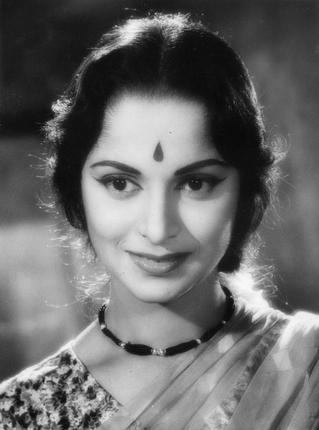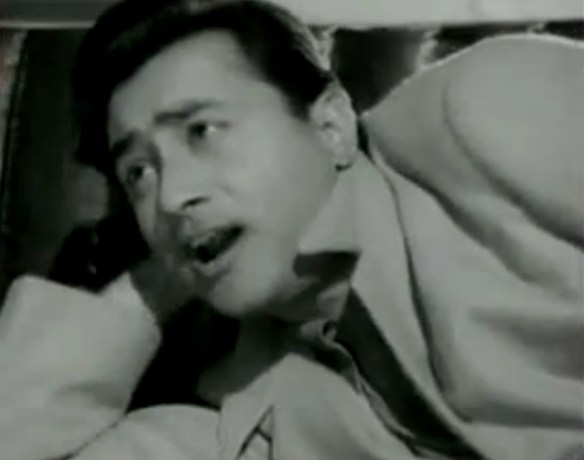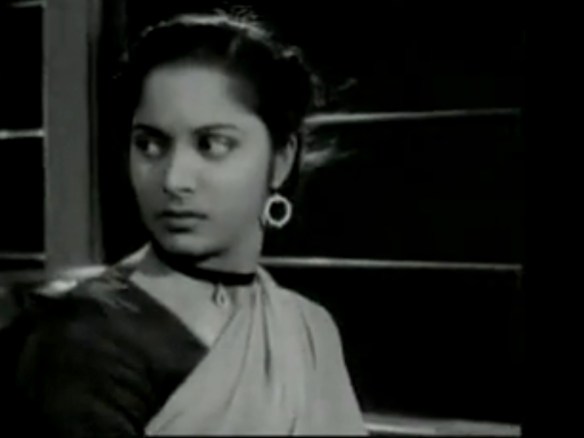You gotta love this song. Hemant Kumar, whose forte is usually deep soulful melodies, outshines everyone in this catchy classic. Dev Anand stars with the lovely Waheeda Rehman in 1958 quasi-noir Solva Saal, mostly memorable for this all-time hit “Hai Apna Dil To Awara” picturized on a train. What is it about Dev Anand and trains? “Jab Pyaar Kisi Se Hota Hai” is also sung on a moving train to a sulky heroine, although by that point, Dev had perfected the look and ventured outside the train’s window! But that’s another story.
Directed by the legendary Raj Khosla, the shining moments of Solva Saal are clearly the fruits of a brilliant collaboration. While somewhat obscure, the film delivers a high-paced plot with enough twists to keep you glued, but enough groans to make you want to immediately watch a more redeeming Dev-Waheeda film soon after (I strongly recommend Guide).

Drop-dead beautiful Waheeda Rehman plays a risk-taking jilted lover in Solva Saal (1958). Seriously, Waheeda. Stop being so gorgeous!!
The lyrics of this song, penned by Urdu maestro Majrooh Sultanpuri, are just plain and simple fun. In it, the hero personifies his own heart, speaking as if it were another being with a mind and will separate from his own. It’s so clear that Waheeda is having trouble keeping her mind on the awkward guy next to her she’s supposed to be eloping with!
For anyone more in the mood for melodrama, there’s also a “sad” version of this song just before the hero and heroine sort out their differences and live happily ever after. Until then, follow along with the youtube song of the happier classic, and enjoy our lyrics and translation to “Hai Apna Dil To Awara” below!
Hai Apna Dil To Awara Lyrics and Translation
Hai apnaa dil to aawaaraa
My heart is a vagabond
Na jaane kis pe aayegaa
I wonder to whom he will take a liking
Haseeno.N ne bulaayaa, gale se bhii lagaayaa
Many beautiful women called me, they even embraced me
Bahut samjhayaa, yahii.N na samajhaa
They tried hard to explain, but my heart did not understand
Bahut bholaa hai bechaaraa
The poor thing is way too innocent
Na jaane kis pe aayegaa
I wonder to whom he will take a liking
Ajab hai diiwaanaa, na ghar na Thiikaanaa
My heart is a strange madman, he has no house and no abode
Zameen se begaanaa, falak se judaa
He has no roots with the Earth, he is distanced from Heaven
Yeh ek tuutaa huaa taaraa
He is a shooting star
Na jaane kis pe aayegaa
I wonder upon whom he will fall
Zamaanaa dekhaa saaraa, hai sab kaa sahaaraa
I have seen this whole world, I have everyone’s support
Yeh dil hii humaaraa, huaa na kisii kaa
Only this heart of mine never gave himself to anyone
Safar mei.N hai yeh banjaaraa
He is a gypsy on a journey
Na jaane kis pe aayegaa
I wonder to whom he will take a liking
Hua jo kabhii raazii, to milaa nahii.N qaazii
If he ever agreed to someone, no pandit could be found
Jahaa.N pe lagii baazii, wohii.N pe haaraa
Wherever he has taken a gamble, he lost
Zamaane bhar kaa naakaaraa
He is rejected by the whole world
Na jaane kis pe aayegaa
I wonder to whom he will take a liking
Glossary:
awaaraa: vagabond; bhola: innocent, pure; bechaaraa: poor thing; ajab: odd; diiwaanaa: madman (from love), ghar: house, Thikaanaa: abode, shelter; zameen: Earth; begaanaa: distanced, estranged; falak: sky, Heaven; tuutaa hua taaraa: a fallen star; sahaaraa: support; safar: journey; banjaaaraa: gypsy, nomads of North Indian origin; raazi: agreement, qaazi: a judge who in Islamic faith can legalize a marriage as witness; baazi: a gamble, a round of cards, haaraa: lose; naakaaraa: rejected
A brief note on the word “vagabond.” The somewhat arcane term is inevitably used across many sources to translate the Hindi word aawaara dating back to Raj Kapoor’s breakthrough film of the same name-so for posterity’s sake, I have translated it similarly. Still, I have never held that the word does justice to what aawaaraa is. Just to clarify, someone who is an aawaaraa is not necessarily a vagrant with all the connotations that come with the English usage—i.e. homeless, unemployed, etc. Aawaaraa, especially as it is commonly used poetically in Hindi films, is someone carefree, independently wandering and unwilling to be tied down. It’s a subtle, but pretty important distinction. I’m glad we’re all on the same page on this.
More importantly, does anyone else question the slightly awkward cheering and whoops that occur to punctuate this otherwise straightforward song? Listen carefully right during the interlude music just before the last stanza. I mean, can you imagine being a chamcha in S.D. Burman’s brainstorming session when someone decided this was a great idea? And furthermore, I don’t think that the voice is Hemant’s or Dev Anand’s doing the whooping. That means some random chamcha had to come in to the recording studio, put on the headphones, stand in front of an isolated mic, and make these wild sounds that S.D. Burman mixed lovingly into the track.
CHAMCHA: How was that, Boss?
BURMAN: Almost, almost. Right there, where it sounds like you’re having an esophageal hernia. Give me a little more of that kind of enthusiasm.
CHAMCHA: [whoops brains out]
BURMAN: Brilliant! That is precisely the touch that this composition needed. Aloo tikkis are on me tonight!
The whole thing just strikes me as trippy. Of course, we know R.D. Burman took those spastic noises to new heights in the decades following, so I guess we now know where it came from!
– Mrs. 55



The chamcha thing was so funny; I must give it a try 🙂 and thanks for explaining Awara for those who don’t know Hindi/Urdu. Things tend to seem different in a word-to-word translation; good to explain it!
Thanks for the comments! It’s true that every language has words that does not quite have a single exact translation–part of why we LOVE studying complex Urdu-Hindi!
Nice song. This is a little off-topic, but as u’ve mentioned it, I just saw Guide for the first time a couple of weeks ago and loved it! There’s so much to like in that film, excellent script, so many memorable and striking scenes (Rosie’s confrontation with Marco in the caves and that powerful exchange that occurs between them, also when she purchases the Ghungru at the bazaar and puts them on with this new sense of buoyancy and excitement…and many more…).
I had been familiar with the songs, of course, but for the first time I understood their context. Very good performances, particularly by Waheeda I thought…Dev was a good-looking guy but his acting style never really appealed to me…in this, however, on the strength of a stellar script, and the likeableness of the character he is endowed with, he is also very good. I’m kind of ambivalent about the last 15 mins or so of the film….I think stuff like that can happen, but I wasn’t sufficiently persuaded of it in the context of the film.
Even so, it is a very good film and has usurped ‘Mughal e Azam’s position as #2 in my list of all time favourite Indian films, after of course, the film I’m always on about. Which is kind of surprising, because it is in some respects very ideologically different to Pakeezah. Because I saw it recently, and was impressed I had to gush about it a bit 🙂
Haha, yes, we agree Guide is unarguably one of the best Hindi films made! If you enjoyed it, try reading R.K. Narayan’s novel that it was based on (it’s written in English)! The book is amazingly well-written–and might help elaborate on the Vedic twist of the ending. Stay tuned for our upcoming Guide posts!
One of my favorite songs by Dev Anand, and he had quite a collection to choose from! Perhaps simply because of the way it never fails to put me and everyone around me in a good mood just by playing.
It’s a feel-good song, and that’s a rare and magical thing in the Hemant Kumar repertoire! We agree, Dev Anand does full justice to it!
I agree with you that “awaara” does not always mean vagabond. In Raj Kapoor’s “Awaara Hoon” vagabond or vagrant were apt descriptions. But in Hai Apna Dil, in my view, “awaara” means carefree, independent, free and unrestrained. So, you are right: awaara has different meanings: one that applies to Raj Kapoor’s “Awaara” and the other that applies to this song.
Yes, it’s a misleading relic that’s been carried over for decades! We try to make sure to put our translations into context with each post so subtleties such as this can be appreciated. Thank you for the comment!
I think I read somewhere that the harmonica passage in the song was by a young Rahul Dev. Apologies if I got that wrong,
You’re absolutely right! S.D. Burman often allowed his son to join in on his recording sessions, and in this case its R.D. himself who plays the iconic harmonica sequence!
9/8/15 Thank you for the update. Amarante M. Carvalho
Thanks for the confirmation about R.D. and the harmonica passages. Which leads me to speculate: Could it have been R.D. who did all the “whooping” instead of some “random chamcha”? He was there at the recording session and we know he is capable of vocalizing such whoops!